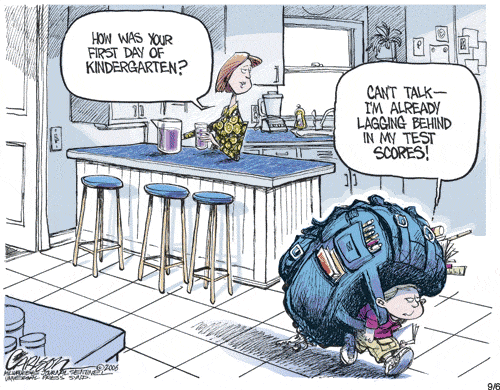Larry Cuban on School Reform and Classroom Practice: Kindergarten Teachers’ Effects on Five Year-Olds’ Futures
I never went to preschool. I also missed being in kindergarten when I went to a Pittsburgh (PA) elementary school in the early 1940s. It was my loss.
Why a loss? Because there is much evidence–both quantitative and qualitative–that what five year-olds learn in kindergarten when strong ties exist between them and their teachers produce short- and long-term effects (e.g., cognitive gains, social behaviors, and psychological benefits) that last into adulthood. In the past few decades, educational researchers and social scientists have fastened upon metrics that seemingly prove that such outcomes have occurred (see here and here).
More recently, economists have gotten on board with their algorithms and cost-benefit analyses and found that preschool and early childhood school experiences did, indeed, have long-term effects on adult earnings, getting married, raising families, and daily behavior in the community. See here, here, and here. Because economists have accrued outsized influence on U.S. policies in health care, education, government operations, and other sectors, their cost-benefit analyses have helped in building political coalitions supporting investments in early childhood education, especially for low-income families.
But you do not need social scientists to tell parents or early childhood educators that kindergarten helps all children build mind, body, emotional strengths, and lifetime habits. For decades, preschool and kindergarten teachers have believed that such effects lasted beyond preschool into elementary and secondary grades. Middle class parents also.
Remember Robert Fulgrum’s best seller, All I Really Need To Know I Learned in Kindergarten? Although critics have called the collection of short essays trite and sugary, the book has sold over seven million books since 1988 and continues to sell well a quarter-century later. The part about kindergarten sums up what so many Americans still believe are core values and behaviors learned in families and school.
- Share everything.
- Play Fair.
- Don’t hit people.
- Put things back where you found them.
- Clean up your own mess.
- Don’t take things that aren’t yours.
- Say you’re sorry when you hurt somebody.
Sure, these behaviors are learned in families first and then in preschool and kindergarten. Academics call these learned behaviors socialization. Five year-olds learn how to behave in groups in the next dozen years as students and as adults later. Ah, but trying to get metrics to capture these all-important learned behaviors still remain beyond the reach of current social scientists including economists.
If Fulgrum’s platitudes annoy social scientists and educational researchers, few ever ask adults about their memories of those early years in school. Even fewer researchers listen to those parents who remember well their kindergarten teachers–experiences at least three to four decades earlier. But all of that has now changed with the foot-to-the-pedal, standards-based school reform since the early 1980s. Those reforms have altered the character of kindergartens.
Kindergartens today have become academic boot camps for first grade. Much time is spent on getting children to read, learn arithmetic and getting tested.There are now pre- and post-tests for reading and math, most often timed to get supposedly accurate measurements. And Common Core standards for kindergarten are yet to be implemented with more of the same academic concentration.
Many teachers and parents have complained about the loss of play-time and children choosing activities. As standards-based testing and accountability have seized three-to-five year-olds, parents and teachers have noted increases in thumb-sucking and bed-wetting. In short, top-down pressures to teach academics to young children has reshaped the relationship between early childhood teachers and young children in negative ways (see here and here).
So test-driven policies using easily quantifiable measures have indeed influenced how kindergarten teachers practice by squeezing students to achieve academically and, in doing so, has eroded the all-important teacher-child relationship, one that remains central to what five year-olds learn and practice for years to come.
And here is the rub. Policymakers have largely ignored the teacher-child relationship–arguing that they are more concerned with tangible outcomes not how teachers teach or children learn. As for researchers, they have been of little help since they have a hard time identifying metrics that capture the quality of that child-teacher relationship and its links to socializing children and subsequent academic and non-academic effects on adult behavior. Without quantitative measures to capture the impact of the teacher-child relationship, policymakers skip over it and grab at what can be reduced to numbers; that all-important relationship is missing-in-action when policymakers make decisions. And that is unfortunate.
In the current climate of test-driven standards and coercive accountability, policymakers and researchers depend far too much upon test scores and not whether what is measured captures the cognitive and social-psychological habits young children acquire and the all-important relationship they have with their teachers. If there are no measures, then these important outcomes do not exist.
________
Thanks to Susan Ohanian for finding the above cartoon
This blog post has been shared by permission from the author.
Readers wishing to comment on the content are encouraged to do so via the link to the original post.
Find the original post here:
The views expressed by the blogger are not necessarily those of NEPC.

